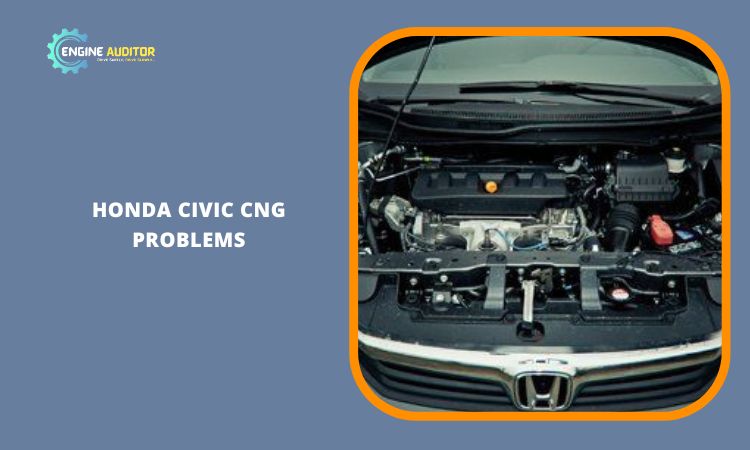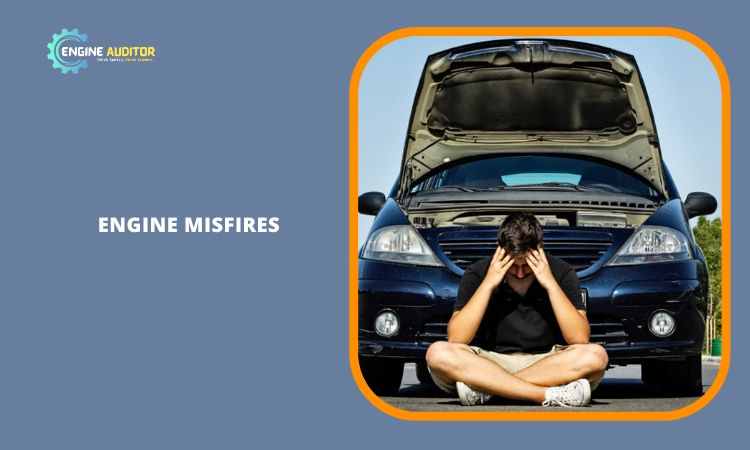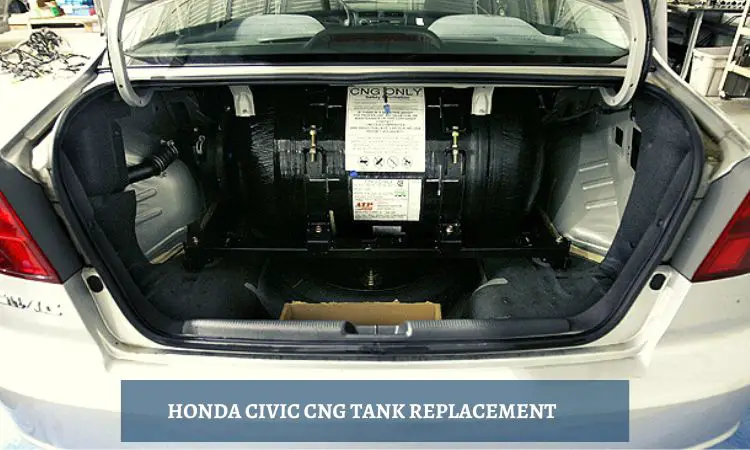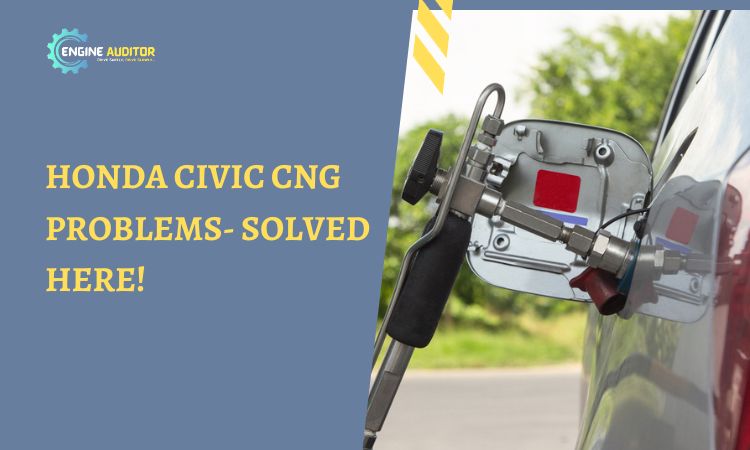Hey there! This post contains affiliate links to products. We may receive a commission for purchases made through these links. But it never influences our product selection process.
Many advantages come with CNG on Honda Civics, including fewer emissions and significant fuel cost savings. But fewer problems are also common when you have a CNG vehicle that needs quick fixes.
How do you troubleshoot Honda Civic CNG problems? Low pick while accelerating is a common issue that every CNG user claims. However, if you do not keep your Honda Civic well-maintained, you may also experience engine misfire, gas leak, or AC tripping issues on a CNG vehicle.
Here, I will tell you about a few major problems you may experience and how to deal with them. Stay tuned and learn to keep your Honda Civic in excellent condition while having a CNG system.
Common Problems with Honda Civic CNG
If you have a Honda Civic CNG vehicle, you may experience the following problems.
- Low pick-up
- Engine misfires
- Gas leak
- AC Tripping
Are you experiencing issues when starting your Honda Civic? Read this blog; it may help you solve the issue: Honda Civic won’t start clicking noise.
Honda Civic CNG Problems and Solutions

Problem 1: Low Pick Up
Low pick-up while accelerating is a common issue that every user may experience. It happens because of reduced engine power due to the low combustion of CNG. It provides less energy than gasoline, affecting overall performance and acceleration.
Solution:
- Check for the fuel pressure; it should be at the recommended level. Make sure the CNG system is delivering adequate fuel pressure. If the pressure is low, increase it to the recommended level.
- Next, check for the spark plugs due to wear and tear or dust becoming low at performance. If you have faulty plugs, replace them.
- Air filter cleanliness is also an excellent way to ensure a proper air-intake-enhancing combustion process.
- A clogged air filter can also affect a vehicle’s acceleration. Check and ensure fuel injectors are clean; otherwise, clean or replace them to ensure proper fuel supply.
- Also, check and remove carbon deposits from the throttle body.
- After that, take a test drive to ensure engine performance improves.
It may help you fix automatic transmission issues: Honda Civic automatic transmission not shifting.
Problem 2: Engine Misfires

Engine misfires are another common issue that most CNG vehicle owners face. It mostly happens due to problems with fuel pressure or the ignition system. Your CNG vehicle needs proper care and maintenance to ensure smooth engine performance.
Solution:
- Check Spark Plugs: Worn or fouled spark plugs are a common cause of misfires. Replace them if necessary, and make sure they are properly gapped.
- Ignition Coils: Faulty ignition coils can lead to misfires. Test and replace any defective coils.
- Fuel Injectors: Dirty or clogged fuel injectors can disrupt the fuel-air mixture. Consider cleaning or replacing them.
- Air Filter: A clogged air filter can affect the air intake, leading to misfires. Replace the air filter regularly.
- Fuel Filter: A clogged fuel filter can restrict fuel flow, causing misfires. Replace the fuel filter if needed.
- Check for Vacuum Leaks: Vacuum leaks can affect the air-fuel ratio. Inspect hoses and connections for leaks and replace any damaged components.
- Compression Test: Perform a compression test to check the health of the engine’s cylinders. Low compression can lead to misfires.
- Mass Airflow Sensor (MAF): A faulty MAF sensor can cause incorrect air measurements. Clean or replace the MAF sensor as necessary.
- Throttle Position Sensor (TPS): A malfunctioning TPS can impact engine performance. Test and replace if needed.
- Engine Control Module (ECM) Update: Check if there are any available updates for the engine control module. Sometimes, a software update can resolve issues.
Problem 3: Gas Leak
You may also experience gas leak issues on the Honda Civic CNG. It happens due to wear and tear or using low-quality gas lines. It needs immediate fixation for smooth engine performance.
Solution:
- Turn your car off and park it in a well-ventilated area.
- Access the gas lines and try to inspect for a gas leak. If necessary, use the soapy water to identify the bubbles on the leaked surface. While checking carefully, check the important areas, like the connections.
- If there is a leak, repair it. But if you think repairing it will not be beneficial, replace the needed parts.
- Always replace the seals when doing some work with a gas line or gas kit.
If you are facing distributor problems with your Honda Civic, you must read this blog: Honda Civic distributor problems and solutions.
Problem 4: AC Tripping
Ac Tripping is another issue you may face when having a Honda Civic CNG. AC needs high electric power to work. On CNG vehicles, if maintained poorly, you can experience AC tripping.
Solution:
- Check for fuel pressure and ensure the pressure is okay.
- Check for the air filter and ensure it is working properly.
- Then, check the CNG injectors and ensure they are clean and gas flows properly.
- Also, check for the AC compressor wear and tear.
- Replace or repair items that are needed.
Honda Civic CNG Tank Capacity
| Model (Year) | Capacity( Gallons) |
| 2016- 2023 | 12.4 |
| 2015 | 8 |
| 2014 | 13.2 |
| 2012-2013 | 8 |
| 2010-2011 | 7.8 |
| 2009 | 8 |
| 2008 | 13.2 |
| 2006-2007 | 8 |
| 2004-2005 | 13.2 |
| 2003 | 8 |
| 2001-2002 | 13.2 |
Honda Civic Natural Gas Pros and Cons
Like other fueling options, CNG also has benefits and drawbacks. Here, I have listed a few of its pros and cons to make you able to make an informed decision about choosing the fuel for your vehicle.
Pros:
- CNG is an excellent option for those looking to reduce operational costs.
- CNG is more environmentally friendly than other fuels. It burns cleaner and emits very few harmful gases.
- Due to cleaner combustion, CNG engines need less care and maintenance
- CNG covers more miles than gasoline or diesel engine vehicles.
Cons:
- Its availability is limited, with only a few stations. You are always worried about filling the tank.
- CNG tanks have less fuel capacity than gasoline or diesel.
- CNG vehicles are expensive.
- The sale value of CNG vehicles is very low.
- Vehicles with CNG systems run slower compared to petrol or diesel engines.
Honda Civic CNG Tank Replacement

Replacing the CNG take is a time-consuming process that needs careful handling to complete the task successfully. Here, I have listed the detailed steps to replace a CNG tank.
- First of all, park your Honda Civic on an even surface
- Then, depressurize the CNG tank.
- Turn the engine off.
- Locate the tank. Usually, it is in the car’s trunk.
- Disconnect the fuel lines and electrical connections. If you have a covered tank, also remove the cover.
- Look for the bolts that hold the tank; once all bolts are removed, detach and remove the tank.
- Place the old tank aside and unpack the new compatible tank.
- Carefully place it and then mount the screws. Make sure there are no loose bolts.
- Now, connect the wires and fuel lines. Put on its cover.
- Turn on the engine and test if the vehicle is running without problem.
- Refill the tank and get back to the road.
Honda Civic CNG Tank Replacement Cost:
It is a costly task that may need $1000 to $2000 to complete. However, factors such as location, tank size, and quality may affect the cost. Before replacement, check and verify the actual cost.
Frequently Asked Questions (FAQs):
Is CNG harmful to engines?
How long do Honda Civic CNG tanks last?
What is the average per kg in CNG for a Honda Civic car?
Does CNG affect speed?
Conclusion
Honda Civic CNG is an affordable option than gasoline. It is friendly, needs less maintenance, and covers more distance. But you may experience a few issues, such as low pick, engine misfires, and ac tripping. However, you can overcome these issues with little care and maintenance.

